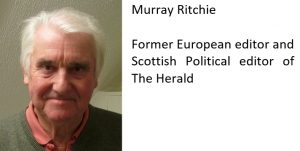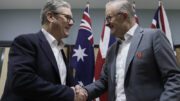Murray Ritchie poses the question: would Boris Johnson dare to walk away from the EU with no deal? Is all the talk of impending catastrophe just that? Talk?
Brexit deal negotiations between the United Kingdom and the European Union are bogged down. We know that because the word from London and Brussels is depressing: stalemate.
In normal times we might not have to worry too much. Both sides in the Brexit discussions have a long history of sending out downbeat signals until, inevitably, an agreement of sorts is reached.
But if you speak privately to insiders in Brussels today the mood is unusually pessimistic. In London on the other hand there are sounds of determination to bash on regardless – a message playing to deaf ears across the channel.
The cry from London is that Britain’s precious sovereignty must be respected. From the EU comes a demand that a level playing field is essential for any deal. And if there is a deal it must not allow the UK to transform itself from partner to competitor.
A price must be paid by Britain for leaving the EU and its trading opportunities and advantages. Not a punishment, you understand, according to the EU, but a loss of influence once enjoyed as a partner who walked out of the family.
In Brussels there are accusations that the UK is simply refusing to make realistic demands and that perhaps an elaborate bluff is being carried out. Eurocrats suspect Boris Johnson is pursuing no deal.
It is thought in Brussels that the British prime minister has a starry-eyed vision of Britain as a low-tax, free enterprise haven which would undermine the EU’s single market and give the British a huge trading advantage.
That of course is simply unthinkable across the channel especially in France where President Emmanuel Macron has long said as much. He is hostile to any meaningful advantage from Brexit which must mean the level playing field must be just that – level. The European Parliament, which must approve any deal, agrees.
Right now, we hear, no-one in either camp expects a deal unless something dramatic changes. The mood in Brussels is interesting because this unusual level of concern appears genuine when you listen to the Euro-cognoscenti.
David Frost, the prime minister’s chief Brexit negotiator, appears unyielding. He is firmly on the record insisting that the UK must be free to make its own laws. Take back control, in other words. “It is central to our vision that we must have the ability to set laws that suit us – to claim the right that every other non-EU country in the world has.”
He says progress is, therefore, “limited”.
To which a weary Michel Barnier, the EU’s chief negotiator, replies with slumped shoulders: “We can’t go on like this”.
So, is this just the usual to-and-fro in trade talks, all designed in the fullness of time to lead to the expected last-minute breakthrough and a chorus of champagne toasts to a new happy partnership? Or are the gloom and doom and bad feeling for real this time?
Right now, we hear, no-one in either camp expects a deal unless something dramatic changes. The mood in Brussels is interesting because this unusual level of concern appears genuine when you listen to the Euro-cognoscenti.
When attention in the UK turns to what might happen with no deal there is real and widespread pessimism. How much of this might be shroud-waving is difficult to judge. There is alarmist talk of food shortages, a sudden dearth of drugs, a tidal wave of medical emergencies, not to mention appalling unemployment in a business world already on its knees.
Johnson must now be wondering in his heart of hearts whether the UK needs the EU more than the EU needs the UK.
For their part Brexiteers prefer to think of the desperately needed billions to be saved on EU contributions.
Britain is trying to pile on the pressure with a threat never to agree to an extension of the transition period which has only six months still to run and must be agreed in July. Is this just another Boris bluff?
Boris Johnson is not a Europhobe, merely a Eurosceptic. He says he prefers a deal to the alternative – but not at the price of economic catastrophe. But Johnson is notorious for saying one thing and believing another. Many now see events moving against the UK.
Johnson must now be wondering in his heart of hearts whether the UK needs the EU more than the EU needs the UK.
With Britain already suffering economic collapse – a devastating 20 per cent drop in April’s GDP – because of the Coronavirus and its dreadful death rate compared with most other countries, the idea of a no-deal Brexit is simply not acceptable to much of UK public opinion. Britain keeps threatening to walk away when it sees too little progress. But it doesn’t do so. A sign of weakness?
The pro-EU Scottish National Party’s Pete Wishart, MP, blamed UK negotiators for their intransigence with no deal looming. “It’s going to be misery heaped on misery as Covid and Brexit appear like the twin horsemen of the apocalypse trampling over any prospect of a recovery,” he complained.
Now it seems there is disenchantment spreading across Europe at the Brexit impasse. The heavy mob are preparing to move in.
Macron will be backed by Angela Merkel, the German chancellor, as Germany is set to assume the rotating EU presidency. In times of crisis Mrs Merkel is normally the deciding player. She has a long and impressive record for finding accord where there is friction. She will not wish to be remembered as the major European leader who failed over Britain.
Why, the talks so far have not even managed to get an outline deal on fishing. Britain’s Conservatives have made great play of restoring sovereignty over the fishing grounds but agreement has eluded them.
Not surprising really. If EU boats are refused access to the fishing grounds they’ve enjoyed for 40-odd years why should they agree to buy from a UK monopoly? They can always go to Norway. Unless of course British fishermen are to be sacrificed as they were when the UK joined the Common Market in the 1970s. Fisheries carry strong emotional sympathy – but little political force.
For fish read the broad spread of trade. Can Britain really accept a level playing field when that defeats the whole philosophy of taking back control for competitive advantage? Already Britain has backed down on the imposition of full border checks on EU imports with no apparent reciprocity. Another sign of weakness.
Ursula von der Leyen, European Commission president, has joined the search for a breakthrough. It will be surprising if she succeeds where M. Barnier failed. But she and M. Barnier can turn to 27 EU nations, many deeply hostile to Brexit, for support. That must make the standalone Mr Johnson pause for thought.
For all these reasons some of us still suspect Mr Johnson will have to blink first or suffer disaster. And eventually, deal or no deal, we will discover whether the whole Brexit imbroglio was a dreadful mistake.

Headline Photo Credit: Delpixel/Shutterstock.com




